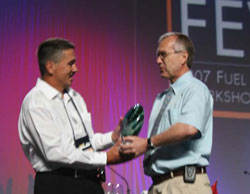A congressional committee has added an amendment to the Energy Bill that would require U.S. Government gas pumps to offer E85 ethanol.
This release from the National Ethanol Vehicle Coalition says Michigan Democrat Representative Bart Stupak’s measure would direct federal agencies to install pumps for renewable fuels like E85 at their fleet fueling centers:
“I was pleased the Committee accepted my amendment to expand the availability of E85 and renewable fuel pumps at federal government refueling stations,” Stupak said. “The federal government is the largest energy consumer in our nation and needs to lead by example. By mandating the expansion of renewable fuel pumps at federal refueling stations, we can ensure federal agencies increase their renewable fuel use and help America move away from its dependence on foreign oil.”
 Phillip Lampert, the Executive Director of the National Ethanol Vehicle Coalition, praised Congressman Stupak for offering the amendment. “We thank Congressman Stupak for his efforts, insight and acknowledgment of the need to move the federal government’s fleet of vehicles onto E85 and other renewable fuels,” Lampert said. “Bart Stupak has long been a leader on energy issues, and we thank him for offering this bi-partisan amendment.”
Phillip Lampert, the Executive Director of the National Ethanol Vehicle Coalition, praised Congressman Stupak for offering the amendment. “We thank Congressman Stupak for his efforts, insight and acknowledgment of the need to move the federal government’s fleet of vehicles onto E85 and other renewable fuels,” Lampert said. “Bart Stupak has long been a leader on energy issues, and we thank him for offering this bi-partisan amendment.”
You can read all of Stupak’s amendment by clicking here.



 Thanks to the
Thanks to the  The chief science officer for
The chief science officer for 
 The latest report from USDA’s
The latest report from USDA’s 
 Democrats in the U.S. House of Representatives have rolled out an energy plan during what they tout as America’s “Energy Independence Day.”
Democrats in the U.S. House of Representatives have rolled out an energy plan during what they tout as America’s “Energy Independence Day.” The nation’s first closed-loop ethanol facility has opened near Mead, Nebraska. Closed-loop means it has a cattle feedlot attached with an ethanol plant. The
The nation’s first closed-loop ethanol facility has opened near Mead, Nebraska. Closed-loop means it has a cattle feedlot attached with an ethanol plant. The  Tennessee Governor Phil Bredesen wants drivers to be able to find ethanol and biodiesel to fill their tanks.
Tennessee Governor Phil Bredesen wants drivers to be able to find ethanol and biodiesel to fill their tanks. You can check out Tennessee’s biofuels efforts at
You can check out Tennessee’s biofuels efforts at  The administrator for Region 7 of the U.S. Environmental Protection Agency told participants at the
The administrator for Region 7 of the U.S. Environmental Protection Agency told participants at the